Celebrating International Day of The Girl Child!
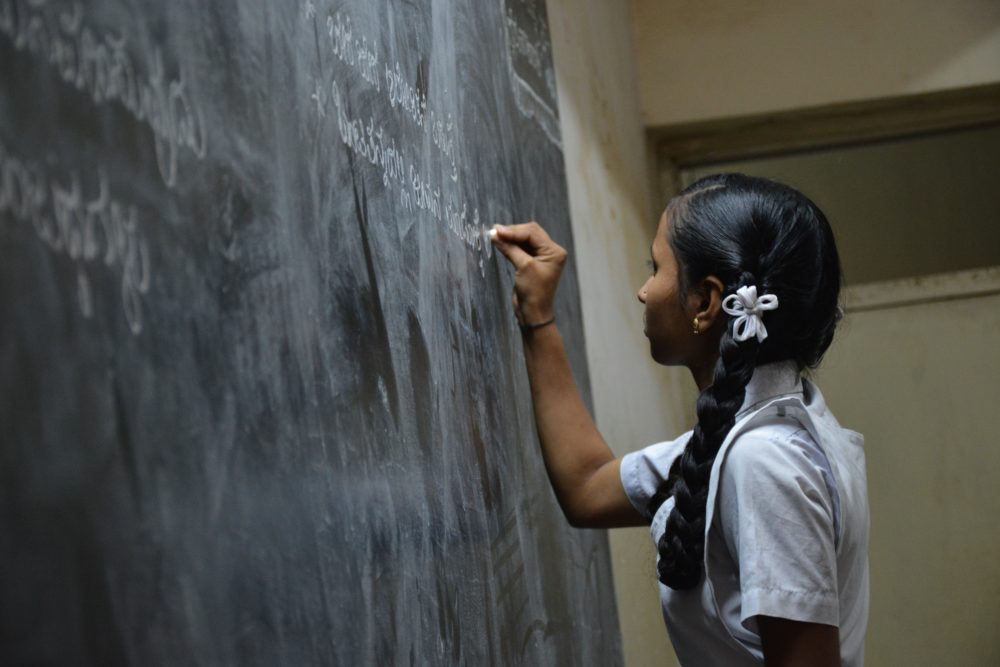
In 2012, the United Nations (UN) declared October 11th International Day of The Girl Child. Since then, this day has been commemorated internationally to empower girls and to raise awareness about the challenges they face. Every year, the International Day of The Girl Child is an opportunity to highlight problems in education, health, etc. and advance solutions for their alleviation.
With Her: A Skilled Girl Force
This year’s International Day of The Girl Child theme, “With Her: A Skilled Girl Force”, is a call to support girls as they innovate, inspire and transform their futures.
There are approximately 1.1 billion (UN women) girls in the world, many of whom lack equal access to opportunities enjoyed by their boy peers. Education, is vital, basic human right to which girls around the world are denied access. According to UNESCO, girls are more likely to never enter primary school than boys. Those who are lucky enough to be enrolled in school will have completion rates lower than those of boys, as their participation dwindles with progression through the education system. As a result, over half, approximately 31 million, of children who are out of school are girls. Rather than get an education or skills training, 12 million girls who are under 18 will be married in 2018, and 21 million below 19 will become pregnant (UN Women). Overall, the statistics of girls’ realities in education and other areas are countless and staggering.
Like millions of girls around the world who are denied opportunities, mistreated, and facing adversity, many Nigerian girls are no exception. In the Northern part of the country, for instance, families would rather their daughters work and bring home income instead of continuing with their secondary school education (equivalent to U.S middle and high school levels). The result is that Nigerian girls’ secondary school attainment rates are 10% lower than those of Nigerian boys. Without education and training, these girls grow up to have limited opportunities for social and economic progression. Moreover, communities are worse off as significant portions of their populations are uneducated and lack adequate skills to increase productivity.
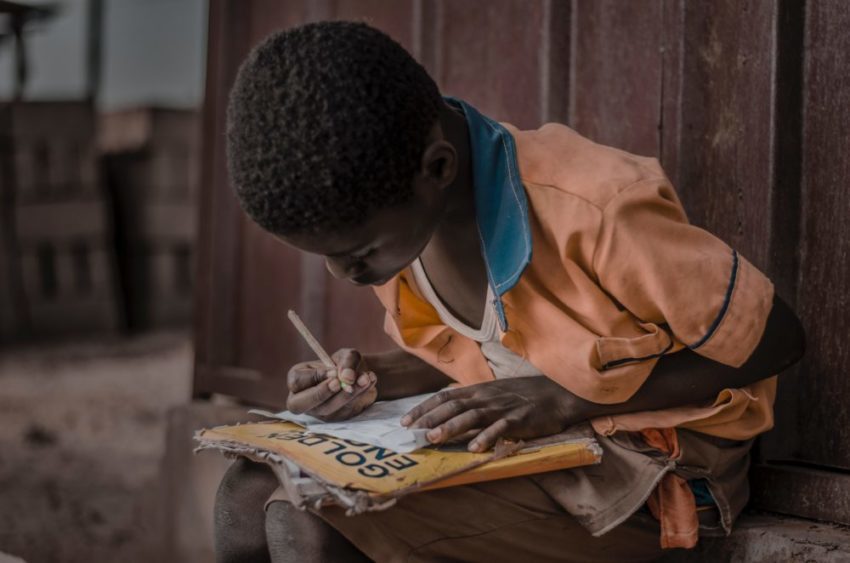 Educating girls is crucial to empowering and preparing them for successful futures, which is why Partners for Development (PfD) enables girls in Nigeria to complete their secondary school education. Through the Anne Johnson Memorial Scholarship Fund (AJMSF), established in 2014, PfD provides scholarships to girls in secondary school. We work with one of our long-term partners, Lift Above Poverty Organization (LAPO), located in Edo State, southwestern Nigeria to administer these scholarships. The scholarships, which cover about 40-50% of the recipient’s total annual school fees, have, thus far, benefited 78 girls! One recipient, Evelyn Igbalagh, called the scholarship a “blessing” that “has helped lift off the burden of education from my parents”.
Educating girls is crucial to empowering and preparing them for successful futures, which is why Partners for Development (PfD) enables girls in Nigeria to complete their secondary school education. Through the Anne Johnson Memorial Scholarship Fund (AJMSF), established in 2014, PfD provides scholarships to girls in secondary school. We work with one of our long-term partners, Lift Above Poverty Organization (LAPO), located in Edo State, southwestern Nigeria to administer these scholarships. The scholarships, which cover about 40-50% of the recipient’s total annual school fees, have, thus far, benefited 78 girls! One recipient, Evelyn Igbalagh, called the scholarship a “blessing” that “has helped lift off the burden of education from my parents”.
This International Day of the Girl Child, and in keeping with the theme “With her: A skilled girl force”, PfD is restating its committed to supporting girls in Nigeria by investing in their education. We believe that when girls are educated, entire societies are uplifted. Educated girls grow up to be teachers, doctors, entrepreneurs, etc. who invest in their communities and help to formulate solutions that reduce poverty and other challenges.
If you want to provide education opportunities for girls in Nigeria, please donate to the AJMSF. With approximately half of Nigeria’s population currently at or below the poverty line (World Bank), many families qualify for our AJMSF scholarships based on economic need alone. As a result, demand for the scholarships currently exceeds financial resources. Your money could help us educate more girls who will innovate, inspire, and transform their futures!

Today is “…an opportunity to transform this momentum into action, to empower women in all settings, rural and urban, and celebrate the activists who are working relentlessly to claim women’s rights and realize their full potential.” (United Nations)
There is no doubt the immense impact women have had and will have in the world. March 8th, 2018 is International Women’s Day, as honored by the United Nations. The UN declared that, “International Women’s Day is a time to reflect on progress made, to call for change and to celebrate acts of courage and determination by ordinary women who have played an extraordinary role in the history of their countries and communities.” Within rural communities, women empowerment is imperative to achieve economic productivity and to ensure the well-being of individuals, family, and the community as a whole. But in 2018, we are still actively fighting for gender parity and women empowerment throughout the world.
In recognition of the potential women have to improve the well-being of their communities and society, PfD’s health, agriculture and microcredit programs specifically target women to provide them with the necessary knowledge and resources to lead healthy lives. Currently in Nigeria, PfD works in rural communities in Abia and Cross River States to improve and expand access to safe and clean water and sanitation with funding from USAID and Coca-Cola. In most of the rural communities of Abia State, community decision making is the sole responsibility of the men. Women’s opinions are disregarded, as community leaders, who are mostly men, often make all the decisions that affect their communities without consulting the women. In some of these communities, women are not even permitted to sit with men while they discuss community issues. Yet women and girls in developing countries bear most of the burden of carrying, using and protecting water. They also have the most responsibility for environmental sanitation and home health (UNICEF).

Women sitting together with the men during the community dialogue in Binyom community in Ohafia LGA of Abia State
Therefore, PfD is ensuring the active involvement and empowerment of women and girls throughout the life of the project. This is a key element that is needed for any water and sanitation effort to be successful – and without further adding to their burden. PfD is establishing and strengthening community-led water, sanitation and hygiene committees (WASHCOMs) with gender balance to drive WASH activities and services in their communities.

Women of Amaja community in Ohafia participating in the WASHCOM election sitting together with the men inside
WASHCOMs have provided women in these communities the opportunity and platform to play an active part in decision making as well as to work alongside men in tackling WASH and other community problems. During assessments and community dialogues, PfD and Local Government Area (LGA) staff found that the women in these communities were deeply concerned about their communities’ WASH gaps and want to work to close these gaps. They showed enthusiasm, passion and willingness to serve their communities in any capacity in order to alleviate their community WASH challenges.
This can-do attitude from the women motivated the formation of community WASHCOM with 50/50 or 60/40 or 40/60 gender ratios as many women were elected into their community WASHCOM. The women in these communities have taken an active role in solving the issues that affect their community.
Join us in celebrating these women and all women throughout the world who are fighting to make a change in their community, and by recognizing the important role all women have within society.
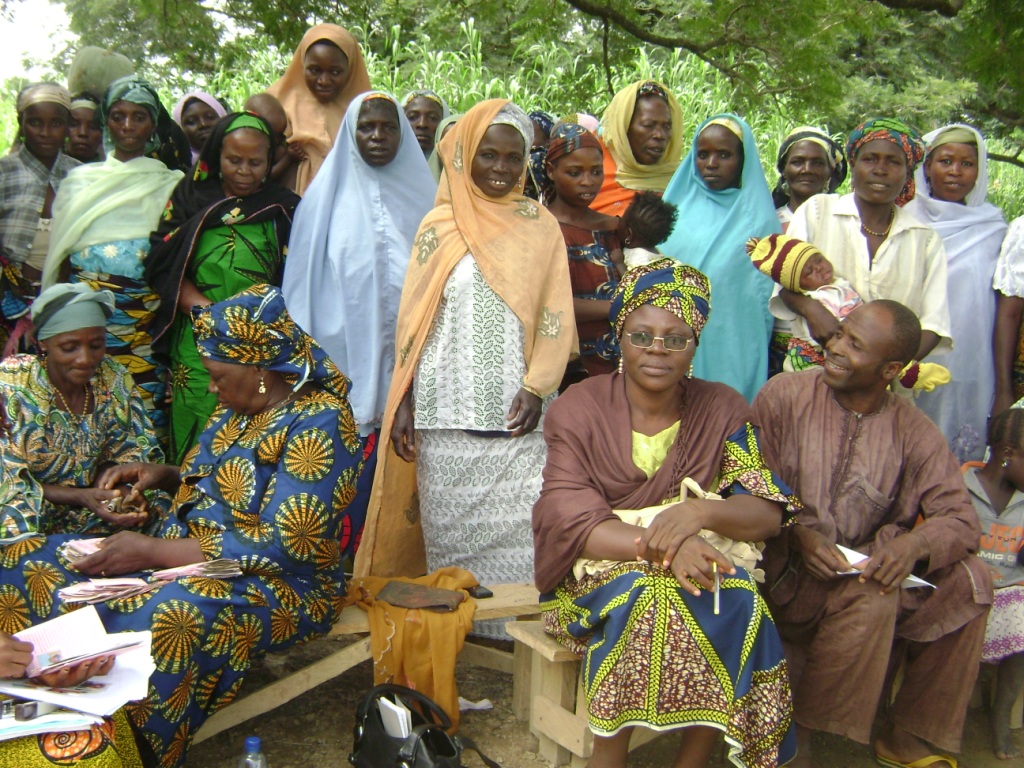
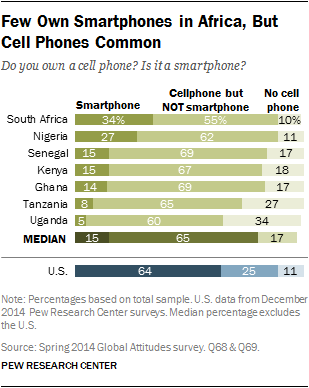
The increasing proliferation of cellphones in Africa brings an opportunity to leap-frog off technological development to innovative mobile interventions. Our case study takes place in Nigeria, with a cellphone proliferation rate of 89%. MHealth is an innovative approach towards the integration of technology and health interventions. However, mHealth is limited for those without cell phone access; generally the most vulnerable like women in rural communities or the illiterate (40.4% of the population over the age of 15 cannot read and write in Nigeria[1]). Therefore, Partners for Development and Dr. Valerie L. Flax, with her team of researchers from the University of North Carolina, provided groups of women with cellphones to research their effectiveness in disseminating and encouraging vulnerable populations to adhere to recommended health practices.
The researchers targeted women-microcredit clients. These women had received small loans and were already integrated into a group dynamic with other microcredit clients where peer support and accountability was highly valued for microfinance program success. PfD’s intervention utilized the pre-existing small groups of women-microcredit clients for the purpose of our health promotion program; by linking social networks together with health information via text and voice messaging we are able to encourage communication and behavior change. The research found that integrating group counseling and cell phone messaging increased the likelihood of women to adhere to breastfeeding recommendations.
Dr. Flax performed a second round of research to analyze the feasibility and acceptability of group cellphones used to promote optimal breastfeeding practices for women’s microcredit groups within Nigeria. During this research, in each microcredit group, one woman was provided a low-cost cell-phone that received text/voice messages weekly on breastfeeding information. The woman responsible for the cell phone was asked to disseminate the information to her group within a week
Key findings from the target group (195 microcredit clients whose babies were born during intervention) include:
- 68% of the time, breastfeeding messages were usually shared in the small groups rather than individually
- 44% of groups met at least once a week to discuss the breastfeeding messages
- 59% of the small groups performed songs and dramas about the breastfeeding messages every week
- 58% of women trusted the messages and were motivated to try recommended practices
- 64% said the group phone worked well or very well
- 35% felt they had the support to carry out the breastfeeding recommendations
With regards to the feasibility and acceptability of providing a single cell phone to a group, focus group discussions showed unanimous neutral or positive feelings towards the single cell phone holder. Reports also show the information was shared promptly. Moreover, women continued to share what they learned about breastfeeding to their family and friends. In congruence with prior research, women in the target group who met at least once a week were more likely to exclusive breastfeed in comparison to women who never met with their group. As we can see, utilizing mobile health promotion in a group setting is a feasible, acceptable and worthwhile approach.
In conclusion, despite Nigeria’s high cellphone penetration rate, women tend to have less access to cellphones and thereby mobile health promotion technology. Therefore, this tactic of targeting women who already have group dynamics formed within their microcredit program was effective in promoting optimal breastfeeding practices through the use of a group cell phone. This research is groundbreaking in exemplifying the feasibility of integrating mobile health technology into groups of the most vulnerable peoples.
At PfD, we are dedicated to delivering local solutions with sustainable outcomes. As seen in this exemplified program, women and children are at the forefront of our programming. Learn more about PfD’s work promoting lifesaving and cost-effective recommended maternal health practices in our blog, https://pfd.org/building-on-the-microcredit-platform-for-better-child-health/. And read more about our work in Nigeria with maternal health here https://pfd.org/the-question-of-quality-comprehensive-respectful-and-rights-based-maternal-health/
Flax V.L., Negerie M., Ibrahim A.U., Leatherman S., Daza E.J. & Bentley M.E. (2014) Integrating group counseling, cell phone messaging, and participant-generated songs and dramas into a microcredit program increases Nigerian women’s adherence to international breastfeeding recommendations. The Journal of Nutrition 144, 1120-1124
[1] https://www.cia.gov/library/publications/the-world-factbook/fields/2103.html
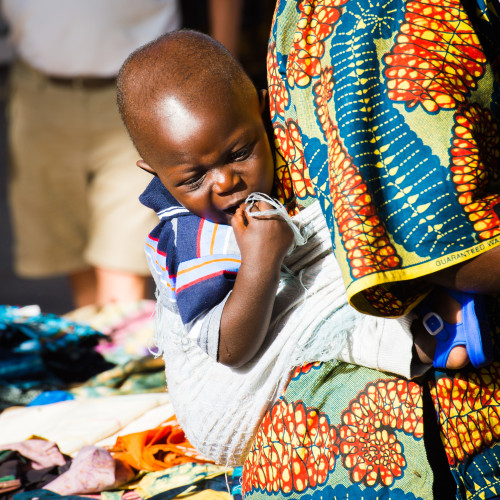
The Question of Quality: Comprehensive, Respectful, and Rights-Based Maternal Health
Imagine that you’re a young, pregnant woman. Imagine that you have to walk five miles to even get to the doctor. You arrive at the clinic, only to sit in a small, hot, overcrowded waiting room for four or more hours. When you finally do get to see a nurse, she mocks your accent, or your clothes. She scolds you for not coming in sooner, and makes you feel ashamed. Your understanding was that it was a free exam, but then you are asked to go to the pharmacy to buy gloves for the nurse. The nurse pricks your finger and says she’s testing you for a disease. You think you’ve heard of this disease, and you heard it kills people. You’re scared of it, but she doesn’t say more – doesn’t say if she thinks you might have it or if it will hurt your baby. You’re given a confusing mix of pills that are bitter tasting, and told that the clinic is out of some. The nurse says you should come back next week to get these, and that you should come back for another exam in 2 months.
Would you return to the health facility?
For many women in the developing world, this example closely resembles their experience. Each year, over 300,000 women die in pregnancy and childbirth, 99 percent of them in the developing world. For every woman who dies of pregnancy-related complications, 20 to 30 more suffer from related on-going conditions which may permanently affect their normal functioning –additional 6 to 9 million women per year. Maternal health advocates, researchers, and providers are committed to ending human rights abuses and promoting skilled and dignified care. Together, we can make comprehensive, respectful, and rights-based maternal health care available to all.
Maternal mortality and morbidity are the tragic result of a myriad of compounding factors. 75% of maternal deaths are caused by severe bleeding, infections, high blood pressure during pregnancy, complications from delivery, and unsafe abortion. Other deaths are often caused by or associated with other diseases such as malaria or AIDS. Delivering at a medical facility with a skilled health care worker present is critical should these complications arise, but often they can be avoided altogether if a woman attends antenatal care visits. However, only 40% of women in low-income countries complete the recommended number of antenatal care visits.
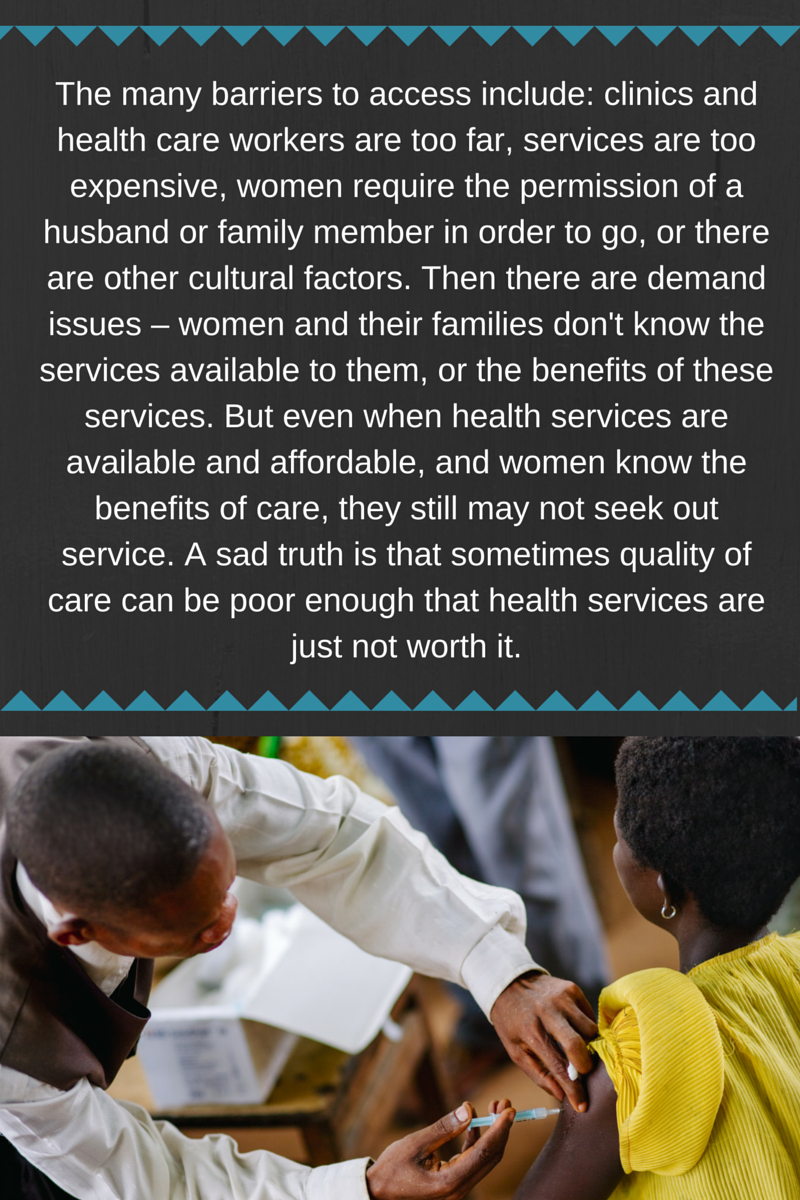
As the example above illustrates, accessing care for some women can not only be difficult, it can be intimidating, humiliating, and scary. Unsurprisingly, receiving poor care makes women less likely seek health care out in the future. This is why it’s crucial to not only provide access (by making healthcare close and affordable), to educate women, their families, and their communities about the importance of maternal health care, but also to work with health clinics and health workers to ensure quality of care – the respectful, comprehensive, and competent care that every human deserves.
At PfD, we deliver integrated programs that address the nuanced reality on the ground. In Nigeria, we not only provide education to women, their families, and communities and engage with key community leaders to change behavior. We also work with health care providers to ensure that they have the knowledge and resources to provide quality care. PfD worked to deliver improved maternal, newborn, and child health services through the training and mentoring of health care personnel, including nurses and midwives, community health extension workers, and community based healthcare volunteers. PfD trained nurses and midwives on quality of care and trained health care workers on Balanced Counseling Strategy which improves client-provider interactions and client satisfaction. The results of this project speak for themselves – In the first year of the project, 15,562 women attended at least one session of antenatal care during pregnancy – by the end of the project over 44,000 did. This represents an increase of over 280%.
Through the Scale-up of Prevention of Mother-to-Child Transmission and Pediatric HIV/AIDS services in Delta State, Nigeria, PfD built the capacity of health facilities, training health workers to provide quality HIV testing and counseling, integrating Prevention of Mother-to-Child Transmission and HIV care into antenatal care services, and upgrading and equipping a laboratory to service as a comprehensive treatment hub. PfD trained health care workers and pregnant women received HIV testing and counseling. PfD also facilitated testing of pregnant women for HIV.
PfD is committed to the idea that no woman should be in danger because she gives birth, which is why we’re joining the global community in calling on the UN Secretary General to recognize April 11th as the International Day for Maternal Health and Rights. Together with the UN community we can make comprehensive, respectful, and rights-based maternal health care available to all. To sign the petition,click here. Follow the discussion at #IntlMHDay and through PfD’s social media updates. To learn more about our work to promote maternal health and healthy communities, click here.
April 6th, 2016, by Katie Baczewski, PfD Program Officer
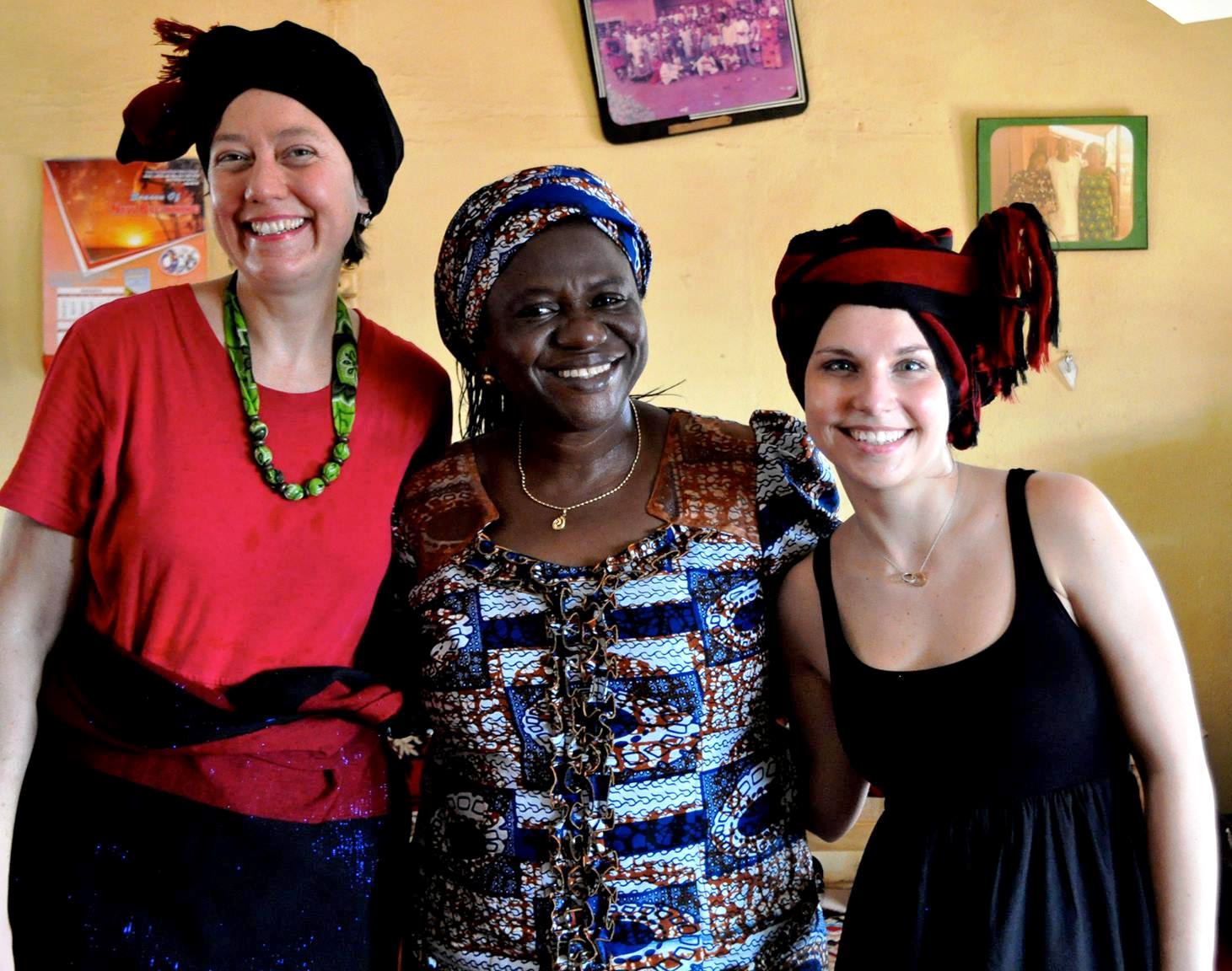
As a young Program Officer working in the Partners for Development (PfD) headquarters, I still remember the first time I met Anne Johnson, PfD’s Nigeria Country Program Director at the time. Although she barely knew me, Anne had such warmth about her she instantly made me feel like we were old friends. Anne had the rare ability to make others feel comfortable in their own skin. Her overflowing positive energy was infectious. Anne was able to bring out the best in you.
 Anne was passionate about many subjects, including girls’ education in Nigeria; hence PfD’s efforts to honor her memory through the Anne Johnson Memorial Scholarship Fund. Numerous studies have demonstrated the relationship in developing nations between education and social and economic well-being: females with a secondary education have lower fertility levels which in turn translates to better physical and economic health for them and their families. “Educating girls can transform whole communities” (Earth Policy Institute, 2011).
Anne was passionate about many subjects, including girls’ education in Nigeria; hence PfD’s efforts to honor her memory through the Anne Johnson Memorial Scholarship Fund. Numerous studies have demonstrated the relationship in developing nations between education and social and economic well-being: females with a secondary education have lower fertility levels which in turn translates to better physical and economic health for them and their families. “Educating girls can transform whole communities” (Earth Policy Institute, 2011).
To PfD Anne was a gifted Country Program Director, Director of Programs, consultant and driving force behind much of PfD’s amazing work. She had an unrivaled passion for the work PfD did and believed in each and every one of our programs. To me, Anne was a mentor, a friend, and an inspiration. Anne epitomizes the passion that drives PfD’s mission. Although Anne’s work with PfD was cut short by illness, her legacy lives on in the people she touched—from the hundreds of field staff, partners and PfD employees to the thousands of women, men and now young girls she helps achieve.
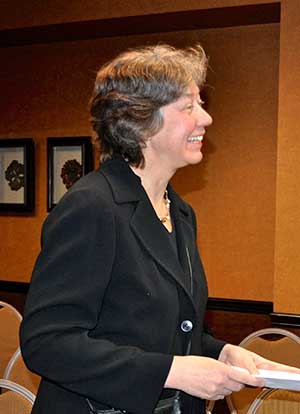 I still remember how confident she was that my background in journalism was just what her staff needed. Anne gave me my first chance to prove myself. She never stopped pushing me—or PfD. As frustrating and difficult as things got, Anne always had a positive spin on everything. Every conversation began and ended with laughter. Anne was one of the most genuine and loving people I have ever come across. In developing my management style, I aimed to emulate Anne’s effortless ability to take things in stride, find the humor in just about everything and believe in people. She was truly a remarkable person and PfD was lucky enough to have a 20-year relationship with Anne. Anne truly was PfD and because of Anne, I am proud to say that #IamPfD too.
I still remember how confident she was that my background in journalism was just what her staff needed. Anne gave me my first chance to prove myself. She never stopped pushing me—or PfD. As frustrating and difficult as things got, Anne always had a positive spin on everything. Every conversation began and ended with laughter. Anne was one of the most genuine and loving people I have ever come across. In developing my management style, I aimed to emulate Anne’s effortless ability to take things in stride, find the humor in just about everything and believe in people. She was truly a remarkable person and PfD was lucky enough to have a 20-year relationship with Anne. Anne truly was PfD and because of Anne, I am proud to say that #IamPfD too.
**Anne Johnson died on Christmas Eve 2013 after a lengthy battle with cancer. Anne’s commitment to PfD continues today in the form of her scholarship fund for young girls in Nigeria. Her full biography and obituary are available on the PfD website.**
Yoga Burn is a yoga based workout program that is specifically tailored to help women lose weight and shape up. Yoga Burn Reviewsis a complete 12 week program designed to help you tone and firm your body while losing weight and improving flexibility. Zoe Bray-Cotton is the creator behind
Throughout all of December we will be sharing stories from our staff, board, partners, and others from around the globe. We can’t wait to share all of the hopeful, engaging, and positive stories from our work. We will be using the hashtag #IamPfD on Facebook, Twitter and LinkedIn.

Be sure to share the posts that you find engaging and inspiring with friends and family and don’t forget to donate and take an #unselfie of you making a donation and share it with us and use the #IamPfD for a chance to win prizes from PfD.
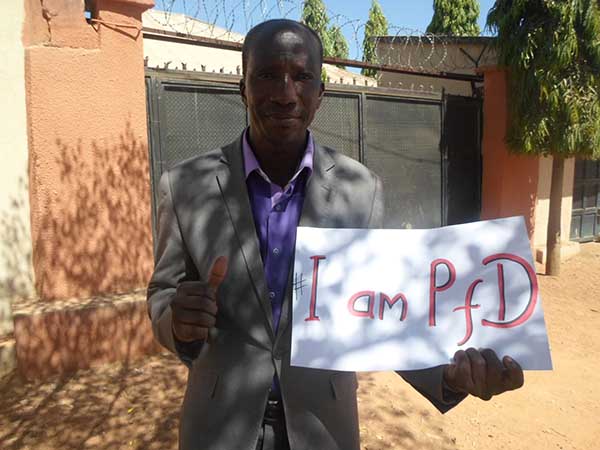
 PfD gives the greatest importance to the role of partners in every aspect of our work. We are deeply committed to involving local counterparts in assessing needs, designing programs, implementing activities and learning from the communities we jointly serve. PfD’s partner-oriented approach directs us to work with and harness the resources of the international community to meet the needs of vulnerable populations. Therefore, during our December campaign we wanted to feature one of our partners. Below is a Q&A with Pastor Ayuba Musa from Gerawa Women Multi-purpose Cooperative Society from Bauchi state, Nigeria.
PfD gives the greatest importance to the role of partners in every aspect of our work. We are deeply committed to involving local counterparts in assessing needs, designing programs, implementing activities and learning from the communities we jointly serve. PfD’s partner-oriented approach directs us to work with and harness the resources of the international community to meet the needs of vulnerable populations. Therefore, during our December campaign we wanted to feature one of our partners. Below is a Q&A with Pastor Ayuba Musa from Gerawa Women Multi-purpose Cooperative Society from Bauchi state, Nigeria.
Q: How did you first learn about PfD?
A: Gerawa Women Multi-purpose Cooperative Society is a community based rural micro-finance organization, base in Bauchi, Bauchi State of Nigeria. The organization got to know about Partners for Development in 2004. Prior to this time, Gerawa has been engaging in micro-credit program in the State at an elementary or infant stage. The institutional capacity of the organization to operate effectively and efficiently and the knowledge on micro-credit standard best practice was low. The capacity of the organization to access loan to finance its clients was low, with low portfolio strength of USD $15,000, out of which 80% of the loans were in arrears. It was at this stage that the organization team up with PfD.
Q: What led you to work with PfD?
A: Gerawa was so fascinated with PfD’s programs in Bauchi state which cut across (a) rural infrastructure development (b) small enterprise development i.e. micro-credit (c) health i.e. Reproductive health (d) and institutional capacity development/building. Taking the capacity challenge of the organization into consideration, Gerawa requested support with the micro-credit program in order to meet the need of our clients and reduce poverty level among the rural and vulnerable household women in the State.
Q: Tell us about the growth of your organization?
A: After over 10 years of good partnership with PfD, Gerawa has grown from lending USD $12,000 to $112,000 per year. Apart from micro-financing, the organization has equally benefited from the following PfD project activities:
Reproductive health training and support
- Integrated health and microfinance programming
- Expanded access to services for agricultural enterprise
- Business development skill training
- Nigeria Agricultural Enterprise Curriculum (NAEC) training and support
All these projects targeted rural women to improve their skills, increase sales and improved income. The uniqueness of implementing PfD project in the communities is integration approach to project delivery, which allows beneficiaries to access and enjoy more than one intervention at a time – holistic development.
Q: How has this partnership impacted your work?
A: The impact of the project implemented with PfD over years resulted in:
Improved Micro-finance: To date, we have issued over 3,200 microcredit loans mainly to women – 95% of borrowers are women.
Institutional capacity development of the organization: At the start of the project with PfD, an operational grant of over a million naira was received from PfD to complement staff salary and other administrative overheads. Likewise, trainings, seminars and workshops were organized by PfD to build the capacity of the implementing staff of the organization in project delivery and methodology so that we could sustain the work after the completion of the grant.
Supporting women farmers: We were able to strengthen the capacity of more than 2,000 small agricultural business holders, who were mainly women, to effectively plan, save, record, forecast, and negotiate properly for their products.
Successful program integration of health and microfinance: A total of 48 communities were reached and 2,747 women borrowers received health training and information, 11,420 immunization were given, 980 women of reproductive age received family planning commodities, 3,620 attended anti-natal care and 122 received various counseling on RH related issues.
Q: Any closing thoughts?
A: In conclusion, PfD has done great things in transforming the lives of ordinary people for the better, but there is still more to be done, thousands and millions of unreached ones are still plaguing in abject poverty and dying daily. PfD still needs more support to be able to continue doing the good work and be able to reach the less privileged.
Throughout all of December we will be sharing stories from our staff, board, partners, and others from around the globe. We can’t wait to share all of the hopeful, engaging, and positive stories from our work. We will be using the hashtag #IamPfD on Facebook, Twitter and LinkedIn.

Be sure to share the posts that you find engaging and inspiring with friends and family and don’t forget to donate and take an #unselfie of you making a donation and share it with us and use the #IamPfD for a chance to win prizes from PfD.

Nigeria is the seventh most populated country in the world, and nearly 50% of the population lives below the poverty line. As a result of Nigeria’s weak health system and high prevalence of poverty, the country suffers from extremely high mortality and morbidity rates among vulnerable people, especially children under-five years of age and women of child-bearing age. People living in the northern states of the country generally suffer from poorer health and health services.
In response, Partners for Development (PfD) began working in Bauchi and Sokoto states to strengthen the relationship between community institutions and healthcare delivery systems and improve overall primary health care services and management provided by local and state governments.
To achieve this, PfD trained and mentored health care personnel who were responsible for delivering family planning and reproductive, maternal, newborn and child health services, including nurses, midwives and community health workers and volunteers. PfD also established committees within each ward and each LGA, building the capacity of each to promote health seeking behaviors within their communities.
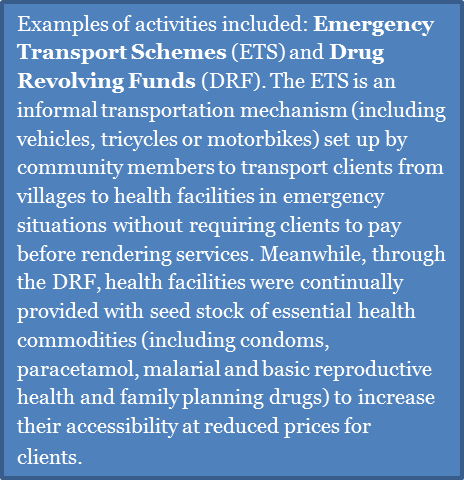
PfD developed and integrated health counseling services, education about best health practices, and the identification of community health workers in order to mobilize communities and perpetuate the success of established activities. In particular, PfD’s work with community health volunteers in disseminating health messages and providing referrals to health facilities significantly contributed to the overall success of the project.
Ultimately, PfD’s community-based approach to development once again resulted in the successful improvement of health services in the target areas of Bauchi State. PfD’s focus on capacity building and sustainable programming allowed for significant achievements in the quality and accessibility of healthcare in the LGAs.
This work was completed by Partners for Development (PfD) under the JSI-led and USAID funded Targeted States High Impact Project (TSHIP) in Nigeria’s Bauchi and Sokoto states. Under TSHIP, PfD won a sub-grant to support initiatives in five Local Government Areas (LGAs) in Bauchi that focused on institutional capacity building, delivery of health services, and community participation in and promotion of health-seeking behaviors. Read more: The Role and Impact of Partners for Development (PFD) in the Targeted States High Impact Project (TSHIP).
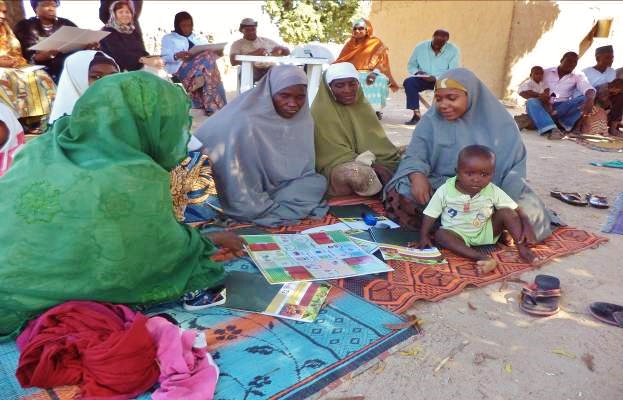
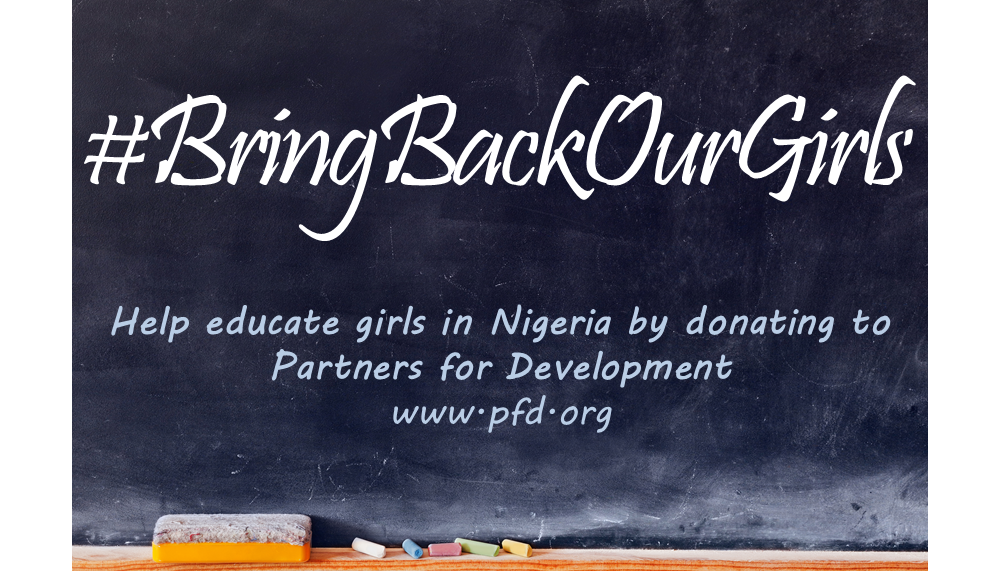
This week marked the one year anniversary of the abduction of the 276 Chibok girls by extremist group “Boko Haram” in Nigeria. This unfortunate anniversary comes with a gift of optimism as around 300 young girls and 150 women were recently found in the Sambisa Forest this past week by Nigerian forces (AP). The Nigerian military has not determined if any of the rescued women and girls were abducted from Chibok or from other areas. The rescue represents hope for the Chibok girls to be returned home (AP).
 In addition to the devastating abduction of the Chibok girls, the communities in Nigeria have faced numerous other challenges, including a decreased ability for international organizations to operate and implement programming. PfD has, for example, experienced delays in implementing activities in some locations close to Boko Haram strongholds and was forced to relocate beneficiaries to safer locations for trainings. On several occasions, alternative and longer travel routes were used to in order avoid attacks. In addition, losses were recorded in PfD’s microfinance program activities due to significant relocation and attrition of borrowers and difficulty in recruiting quality staff in the northern areas.
In addition to the devastating abduction of the Chibok girls, the communities in Nigeria have faced numerous other challenges, including a decreased ability for international organizations to operate and implement programming. PfD has, for example, experienced delays in implementing activities in some locations close to Boko Haram strongholds and was forced to relocate beneficiaries to safer locations for trainings. On several occasions, alternative and longer travel routes were used to in order avoid attacks. In addition, losses were recorded in PfD’s microfinance program activities due to significant relocation and attrition of borrowers and difficulty in recruiting quality staff in the northern areas.
Despite these challenges, employing local staff with a deep understanding of the political, cultural, and security situation has allowed PfD to continue to implement its health program in northern Bauchi State of Nigeria.
Aside from the loss of numerous human lives, destruction of infrastructures and the general deterioration of the economy in the northern region, the education sector has suffered immensely. According to UNICEF, 800,000 children have been displaced throughout Nigeria due to “Boko Haram” violence. The sheer number of displacements combined with a high level of fear of attending school in those areas poses a major threat to the future of the education sector in the northeastern part of the country.
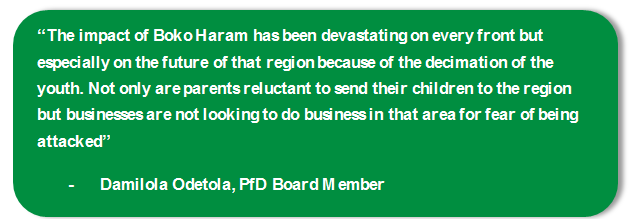 In Nigeria, “about 10.1 million children who are supposed to be in basic education were not in school. In other words, almost one out of every three primary age children is out of school, and roughly one out of four junior secondary age children is out of school” (UNESCO 2012).
In Nigeria, “about 10.1 million children who are supposed to be in basic education were not in school. In other words, almost one out of every three primary age children is out of school, and roughly one out of four junior secondary age children is out of school” (UNESCO 2012).
In a country where school turnout was a serious issue well before the insurgence of “Boko Haram”, the latter has “further compounded the problem of school attendance by destroying school infrastructure and displacing people fleeing violence” according to Lanre Williams-Ayedun, PfD Board Member.
So what are we doing about it?
Educating girls yields a positive impact on economic development and the health of the family overall. PFD continues to advocate for girls’ education in Nigeria through its Anne Johnson Memorial Scholarship Fund (AJMSF) created in honor of the late Anne Johnson, a former Nigeria Program Director who was critically engaged and passionate about girls’ education. In partnership with two local organizations, Gerewa and Lift Above Poverty Organization (LAPO), PfD provides scholarships and opportunities for disadvantaged girls.
Solution and opportunities – What needs be done?
Besides strictly following PfD’s security guidelines, PfD staff members are also in constant communication with members of communities in which it operates to provide intelligence on security situation before any travels around locations infested with insurgents. Communities that surround “Boko Haram” strongholds need to relate useful information to authorities to help facilitate the search and rescue process. If and when the girls are found, steps also need to be taken by the government to provide counseling services to the kidnapped girls and facilitate their reinsertion into their community and society.
What can you do?
- Donate to the Anne Johnson Memorial Scholarship Fundto help girls learn in Nigeria
- Share this post and continue to raise awareness regarding and help girls learn in Nigeria
- Learn about and promote the Safe School Initiative
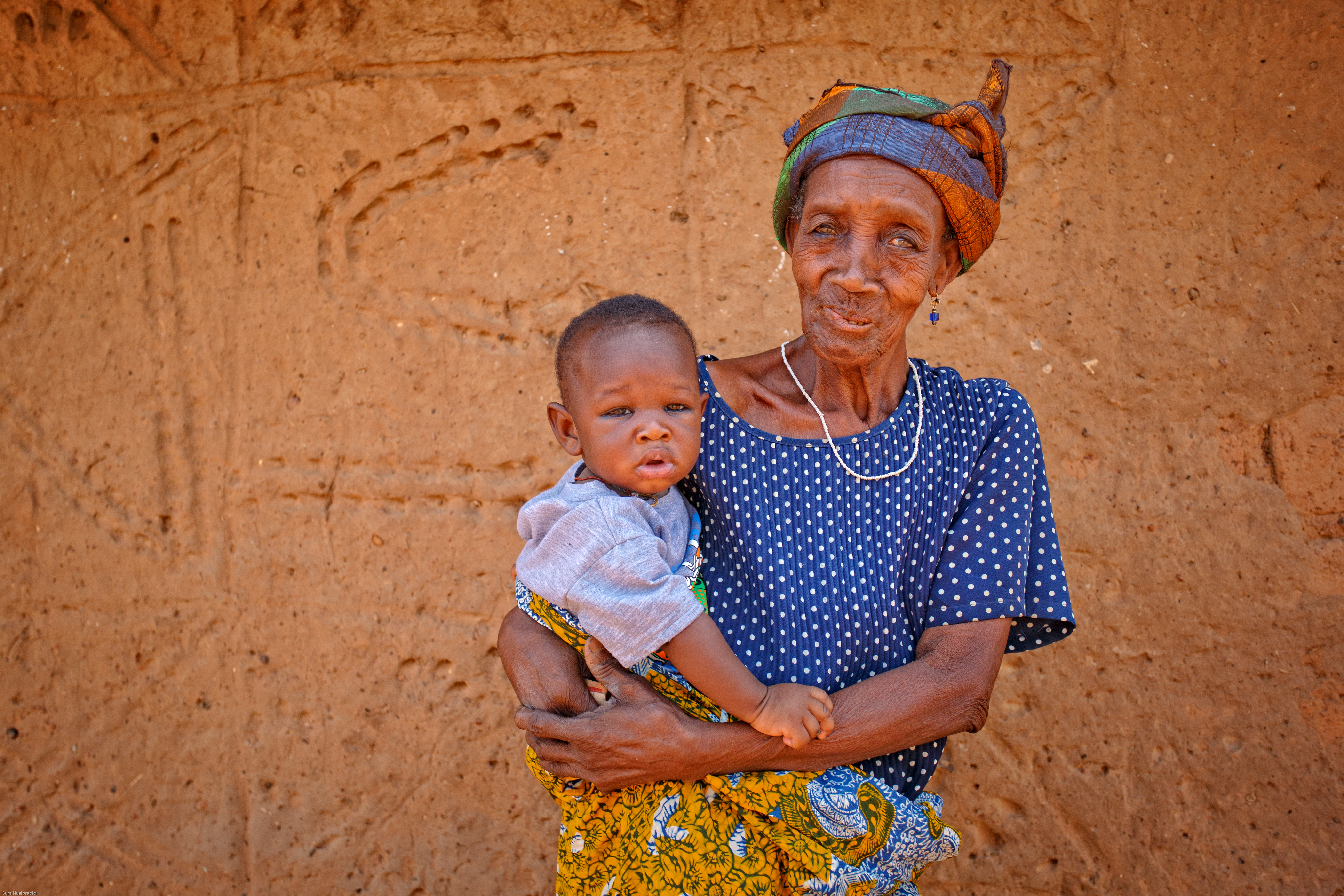
Today, on the 67th anniversary of the creation of the World Health Organization (WHO), individuals and organizations have the opportunity to highlight initiatives around the globe that promote better health. Thus today, PFD shines the spotlight on our work in Sexual Reproductive Health and Rights (SRHR) around the globe.
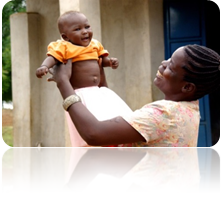 Improving Sexual Reproductive Health Rights (SRHR) is essential for the physical, mental and social wellbeing of individuals, especially women. While progress has been made, women frequently suffer from unequal gender relations, limiting their physical agency and ability to negotiate safe sex. In the developing world, as many as 222 million women do not have access to any methods of contraception (WHO 2015). The consequences of this are far reaching including maternal mortality, physiological trauma, higher rates of STDs and higher numbers of infant mortality. Thus, SRHR is a crucial human rights issue that has long-term implications on global health and international development as a whole.
Improving Sexual Reproductive Health Rights (SRHR) is essential for the physical, mental and social wellbeing of individuals, especially women. While progress has been made, women frequently suffer from unequal gender relations, limiting their physical agency and ability to negotiate safe sex. In the developing world, as many as 222 million women do not have access to any methods of contraception (WHO 2015). The consequences of this are far reaching including maternal mortality, physiological trauma, higher rates of STDs and higher numbers of infant mortality. Thus, SRHR is a crucial human rights issue that has long-term implications on global health and international development as a whole.
PFD has an extensive history with reproductive health programming in both Africa and Asia. In Cambodia, for example, beginning in 2004, PFD partnered with the United Nations Fund for Population Activities (UNFPA) to provide access to quality reproductive health education and services. The program was primarily targeted towards young people ages 10-24 in Kratie Province. PFD also integrated HIV/AIDS prevention into our SRHR programing. This collaboration increased effectiveness and efficiency by reaching the youth with education on both the key issues of reproductive health and disease prevention simultaneously.
Since its initial work in Cambodia, PFD has expanded its reproductive health targeted programming toNigeria. Working in some of the most challenging areas in Nigeria, PFD has successfully implemented integrative reproductive health programming with microfinance initiatives. In Bauchi State, a northern province in Nigeria, PFD has expanded its health systems project Targeted States High Impact Project (TSHIP) in collaboration with John Snow International (JSI) and funded by United States Agency for International Development (USAID). TSHIP fosters improvement of reproductive and family planning services through grassroots techniques and local partnerships. PFD has combined these programs with income generating activities that facilitate business skills and small enterprise development, improving the personal autonomy and livelihoods of poor women.
TSHIP Outcomes as of December 2014:
- Provided Reproductive Health (RH) counseling to 37,528 to males and females or reproductive age.
- Increased the completion rate of individual RH referrals to 74%.
- Provided intermittent preventive treatment (IPT) for malaria to 57,067 pregnant women.
- Aided 10,286 births with skilled attendants.
What can you do?
You too can make an impact on World Health Day. Show your support by sharing on social media and tagging @Partners4dev on Twitter or following us on Facebook. Support Partners for Development’s work in health around the globe and donate here.

Women across the world face many challenges to equality, from access to economic, health, and education resources, to violence within communities and households. To commemorate International Women’s Day on March 8th and this year’s theme Make it Happen, PFD will be honoring the achievements of women around the globe.
Investing in women important not only because it ensures equality, but also because investing in women can produce positive externalities, expanding the impact of each dollar invested.
PFD works across the globe in three main sectors:
PFD works with and supports microfinance organizations and institutions around the world, to increase access to credit for underserved populations. In these programs, over 91% of borrowers were women. PFD has found that when these entrepreneurial women generate additional income, a large portion is reinvested into the family, often paying for school fees for their children. In Nigeria, PFD and Lift Above Poverty Organization (LAPO), a local microfinance organization, further assist women to invest in their families by offering to fund scholarships to daughters of women microfinance clients. According to the World Bank, one additional year of education for girls results in lower infant mortality and higher future incomes. By funding scholarships for girls, PFD and LAPO are also investing in future generations.
On International Women’s Day and always we honor these women.
Health 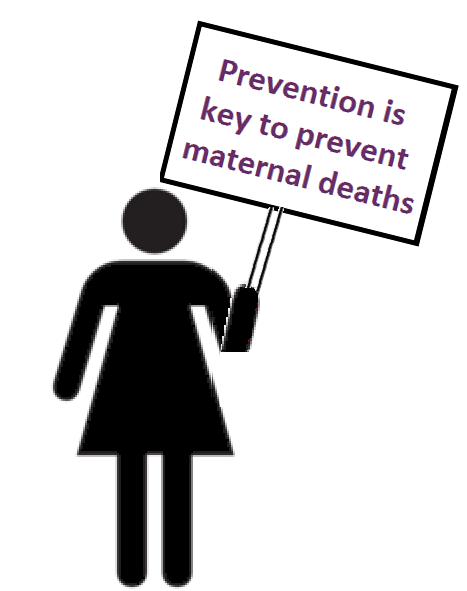 PFD trains community health volunteers to spread health information within their communities. Women who receive this training not only are able to implement changes for themselves, but they also can implement healthier practices for their families. The women are trained to spread the information in the communities and by reaching out to other women, can indirectly reach their families. In Cambodia, for instance, from 2012-2014, PFD trained over 1,500 village health volunteers in malaria health education, a majority of whom were women. In 2013, there were almost 300,000 maternal deaths worldwide related to pregnancy and childbirth. PFD works to prevent deaths by increasing access to skilled health services. In 2013 in Nigeria, with the support of PFD and local partners, 45,501 women attended at least one antenatal care visit and 19,483 women were assisted by skilled delivery attendants during childbirth.
PFD trains community health volunteers to spread health information within their communities. Women who receive this training not only are able to implement changes for themselves, but they also can implement healthier practices for their families. The women are trained to spread the information in the communities and by reaching out to other women, can indirectly reach their families. In Cambodia, for instance, from 2012-2014, PFD trained over 1,500 village health volunteers in malaria health education, a majority of whom were women. In 2013, there were almost 300,000 maternal deaths worldwide related to pregnancy and childbirth. PFD works to prevent deaths by increasing access to skilled health services. In 2013 in Nigeria, with the support of PFD and local partners, 45,501 women attended at least one antenatal care visit and 19,483 women were assisted by skilled delivery attendants during childbirth.
USAID reported in its 2012 “Gender Equality and Female Empowerment Policy” that ensuring women farmers have the same access to land, technology, and credit, crop yields can be increased “as much as 30 percent and feed an additional 150 million people”. In Benin, PFD is implementing USDA’s Growing Resources for Enhanced Agricultural Enterprises and Nutrition (GREEN). GREEN Project is working with farmers associations to increase farm revenues and productivity by building knowledge through trainings, providing information on markets and price information, and increasing access to credit. In 2013 and 2014, through GREEN, PFD and its partners were able to reach over 48,413 farmers, around half of whom were women, with trainings on farming techniques, markets and value chains, and on business development skills. Additionally, PFD integrated its micro-credit methodology into GREEN, increasing access to credit to farmers so they can implement the newly learned skills. Of the 4,680 loans made to farmers, and over 2,250 of the loans were given to women.
On International Women’s Day and always we praise the hard work and perseverance of these women.
How can you Make it Happen?
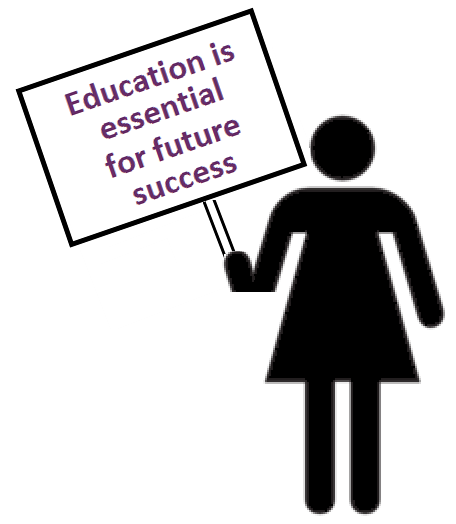
Support Girls’ Education: Help educate and empower the next generation of young women by contributing to PFD here and designating the Nigerian Scholarship fund for Girls.
Give your Support: Support PFD to develop new, innovative programs that support women and girls around the globe here.
Use your voice: Post about women’s social, economic & political achievements using the hashtag #makeithappen or #womensday! Don’t forget to also use the PFD handle @Partners4Dev so we can share your message too!
Spread the word: Repost this blog on social media to help support the movement.


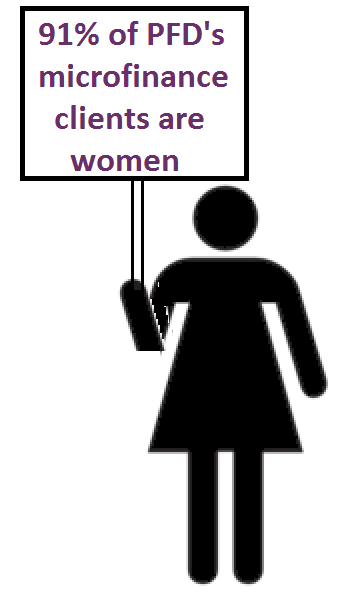 Economic Growth
Economic Growth